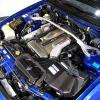Nitrogen In tyres
Announcements
-
Similar Content
-
Latest Posts
-
I think the concept is highlighting the various scenarios where thicker oil helps, and thicker oil potentially doesn't help and only generates heat and costs power, in turn for safety which isn't actually any safer (unless you're going real hot). If anything this does highlight why throwing Castrol 10w-60 for your track days is always a solid, safe bet.
-
Jason should have shown a real viscosity vs temp chart. All the grades have very little viscosity difference at full operating temperature.
-
Oops... I meant to include the connector view... BR/W - power from fuse L/W - motor negative to fan control amp (and off to HVAC pin19) OR/B - PWM signal (from HVAC pin20) B -- ground
-
By Murray_Calavera · Posted
Yep, if you are applying filler it sounds like there is something wrong with the body lol. Safe to assume there is going to be a lot of sanding going on if your still applying fillers. Picture a perfect bare metal panel, smooth as glass. You lay down your primer, it's perfect. (why are you going to sand it?) You lay down the colour and clear, it's perfect. No sanding at all took place and you've got a perfectly finished panel. You won't be chasing your tail, sounds like you were prepping to start laying filler. If your happy with the body after the sanding, there is some bare metal exposed and some areas with primer, no issues at all, start laying the filler. You are safe to lay filler on bare metal or primer (of course check your technical data sheet as usual for what your filler is happy to adhere to). This isn't a 100% correct statement. There is primer that is happy to adhere to smooth bare metal. There are fillers that are happy to adhere to smooth bare metal. Just make sure you're using the right materials for the job. Typically if you are using filler, you would go primer, colour and clear. I've never seen any instances before where someone has laid colour over body filler (maybe this happens, but I haven't seen it before). So your plan sounds pretty normal to me. -
I don't think there's any way someone is push starting this car.. I honestly can barely move it, and moving it and steering it is just flat out not possible. I'm sure it is, but needs a bigger man than me. I have a refurbished starter now. The starter man was quite clear and consise showing me how nothing inside a starter really should contribute to slow cranking, and turned out that for the most part... my starter was entirely fine. Still, some of the wear items were replaced and luckily it didn't show any signs of getting too hot, being unfit for use, etc. Which is 'good'. I also noticed the starter definitely sounded different, which is a bit odd considering nothing should have really changed there.... Removed and refit, and we'll pretend one of the manifold bolts didn't fully tighten up and is only "pretty" tight. GM only wants 18ft/lb anyway. I also found a way to properly get my analog wideband reading very slightly leaner than the serial wideband. There's Greg related reasons for this. The serial output is the absolute source of truth, but it is a total asshole to actually stay connected and needs a laptop. The analog input does not, and works with standalone datalogging. Previously the analog input read slightly richer, but if I am aiming at 12.7 I do not want one of the widebands to be saying 12.7 when the source of truth is 13.0. Now the source of truth will be 12.65 and the Analog Wideband will read 12.7. So when I tune to 12.7 it'll be ever so slightly safer. While messing with all of this and idling extensively I can confirm my car seems to restart better while hot now. I did add an old Skyline battery cable between the head and the body though, though now I really realise I should have chosen the frame. Maybe that's a future job. The internet would have you believe that this is caused by bad grounds. In finding out where my grounds actually were I found out the engine bay battery post actually goes to the engine, as well as a seperate one (from the post) to the body of the car. So now there's a third one making the Grounding Triangle which is now a thing. I also from extensive idling have this graph. Temperature (°C) Voltage (V) 85 1.59 80 1.74 75 1.94 70 2.1 65 2.33 60 2.56 55 2.78 50 2.98 45 3.23 40 3.51 35 3.75 30 4.00 Plotted it looks like this. Which is actually... pretty linear? I have not actually put the formula into HPTuners. I will have to re-engage brain and/or re-engage the people who wanted more data to magically do it for me. Tune should be good for the 30th!
-




Recommended Posts
Create an account or sign in to comment
You need to be a member in order to leave a comment
Create an account
Sign up for a new account in our community. It's easy!
Register a new accountSign in
Already have an account? Sign in here.
Sign In Now